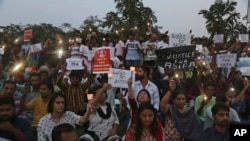The crimes took place months ago in different parts of India — a gang rape and murder of an eight-year-old in Indian Kashmir in January and a rape of a 16-year-old girl in the eastern state of Uttar Pradesh last year. Amid fears that the victims are being denied justice, a chorus of outrage has erupted across India.
The reported details of the brutal gang rape of the eight-year-old girl, Asifa Mohammad Yusuf Pujwala, in a Hindu-dominated region of Kashmir, hit national headlines this week after hundreds of right-wing Hindu activists, including some members of the ruling Bharatiya Janata Party, took part in a march to protest the detention of eight Hindu men in connection with the crime. A group of lawyers also tried to stop police from entering a court to file charges against the accused men.
The support for the accused has sparked a massive wave of anger. The men arrested include a former government officer and police officials.
According to the police, the young girl, who belonged to a family of nomads in Kashmir, was abducted in Kathua and kept captive for days. They say she was heavily sedated and gang raped before being strangled. A shocked nation is drawing comparisons to the gang rape of a physiotherapy student in 2012 that ignited nationwide protests.
Groups of women took to the streets Friday in Mumbai, New Delhi and Benguluru to protest the crime and the hashtags #Kathua and #justiceforAsifa trended on Twitter. Thousands of ordinary people, Bollywood celebrities and cricket stars joined the chorus of protest.
"Yet again we've failed as a society," leading Bollywood actor Akshay Kumar tweeted.
Prime Minister Narendra Modi said Friday evening that those who commit crimes against women will not be spared and the victims will get justice.
"Incidents being discussed since past [the] two days cannot be part of a civilized society. As a country, as a society, we all are ashamed of it." he said.
Leading a midnight candlelit vigil in New Delhi on Thursday, the leader of the opposition Congress Party, Rahul Gandhi, said, "India simply cannot continue to treat its women the way it does."
Amid anger that Hindu activists had sought to give a communal color to a child rape, and the incident could ignite religious tensions, the head of the police in Jammu, S.P. Vaid, told reporters that justice would be done.
"We work as police officers, not as Hindus or Muslims or Christians," he said.
Uttar Pradesh
In an unrelated case in Uttar Pradesh, a local legislator of the Bharatiya Janata Party, Kuldip Singh Sengar, was questioned by federal police Friday, days after an uproar erupted over the failure of the state police to file a case against him over allegations he raped a 16-year-old girl last year.
The case gained widespread attention after the victim tried to kill herself in front of the chief minister's office to protest what she said was police failure to action and to highlight her father's death while in police custody. The teenager's father had accused the local lawmaker of abducting and raping his daughter.
There have been growing questions about why the lawmaker has not been arrested. "The anger quite clearly is over the fact that the ruling party is protecting the accused," says Kavita Krishna, from the All India Progressive Women's Association.
Both cases have put the ruling BJP on the back foot over concerns about its commitment to safety of women.
As the party struggled to contain the political fallout, ministers spoke out saying that the law will take its course. Home Minister Rajnath Singh said Friday that the family of the young Kashmiri girl should get justice. And the minister for women and child development, Maneka Gandhi, said her ministry planned to propose the death penalty for the rape of children younger than 12. The maximum punishment now is life imprisonment.
Activists point out that although India had tightened laws after the 2012 gang rape, this has failed to stem violence against women.





